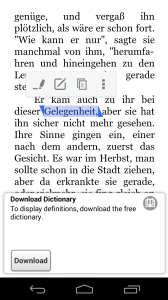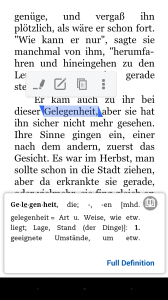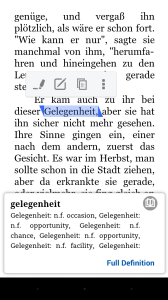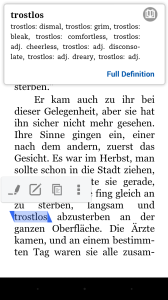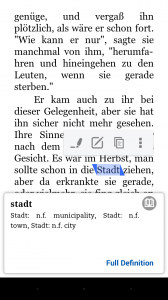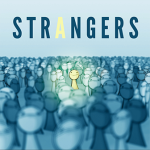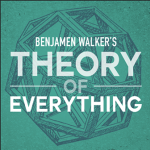André Klein's Blog, page 15
August 8, 2014
Why eBooks Should be Priced Like Apps

Some rights reserved by Jonas Tana
When your browse any of the big online bookstores these days you’ll find both books by independent publishers and traditional publishing houses (“Big Five”). One of the main differences between them lies not necessarily in the quality of writing, editing and cover design — many indies are commissioning professional designs and hiring their own editors – but in pricing.
Yes, that’s right. Some independently published books are becoming so professional that to the reader they are virtually indistinguishable from traditional publications — if only there weren’t that wide gap between their price tags.
As a rule of thumb many independent ebooks range from about $5 at the upper end to the sweet spot of $2.99 and all the way down to the piling $0.99 penny pit. Traditionally published ebooks on the other hand rarely cost less than $10 and almost never cross the $5 threshold at the lower end.
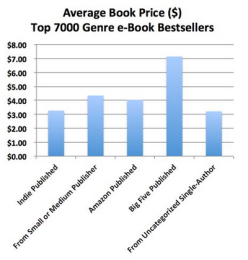
This traditional pricing structure is not much of a mystery, since it more or less mirrors the existing mass market paperback structure. However, what always struck me about the pricing habits of indie publishers is the similarity to the prices of smartphone and mobile apps. There are millions of apps for $0.99, $1.99 and $3.99, but the closer we get to the $5 mark it becomes increasingly less crowded.
Is it just a coincidence that the average Angry Birds clone and any random young adult novel about werewolves both are in the $0.99 to $2.99 range? In other words, is the similar pricing of ebooks and apps a result of shared content characteristics or is it simply a byproduct of digital delivery mechanisms?
Well, let’s start with the most obvious. Customers love small prices. By lowering the price of any digital product incrementally towards zero, the publisher hopes to decrease the threshold of impulse purchases. Especially when the book’s author or app’s publisher isn’t well known, lowering prices to an absolute minimum (even free) can be a way of standing out in the endless sea of stuff.
There are billions of apps and ebooks out there all clamoring for the attention of the buyer. The low pricing structure has become a go-to way for new publishers to gain quick exposure. There’s a growing sense that getting a new app or book out there and garnering reviews, word-of-mouth advertising, etc. outweighs any immediate monetization pursuits, especially if there is no previous audience to build on. It’s eyeballs before wallets, showing off before cashing in.
just bits and bytes …
It has been noted many times that these new ways of marketing and pricing are happening in many industries from music to films and ebooks. Digital delivery and distribution systems (Kindle Store, iTunes Music, etc.) are wielding an increasingly large, albeit indirect, power over pricing.
While protesting these growing digital content monopolies may seem noble (and creating alternatives is certainly crucial), perhaps these concerns shroud the actual issue: all these digital products are just data. Whether it’s a Beethoven symphony, a vampire novel or a Candy Crush clone, they are all just bits and bytes, easily stored and replicated.
As I’ve said before, ebooks are basically just software, so it’s unsurprising that they’re subject to similar pricing and marketing models (freeware, shareware, licensing, etc.). While indie publishers are quick to adapt to this new field, traditional publishers are often resisting this change. They still think in pages instead of bytes.
I’m not saying that a 6,000 page ebook should cost the same as a 100 page short-novel. There still should be some correlation between the sheer amount of words and the price you pay. However, perhaps it may also be useful to look at ebooks in terms of file-size. The problem with ebooks, from a piracy-protection standpoint is that they’re so super small. It takes significantly longer to pirate something like a Game of Thrones seasons or Michael Jackon’s discography than a simple ebook. Even if the literary work was a true doorstopper in its pulpy incarnation, the ebook edition is bound to be just a few kilobytes light.
Am I suggesting that a literary opus like Thomas Mann’s Zauberberg (Magic Mountain) is worth less than a Game of Thrones season, because it weighs less in data units? Of course not. Mann worked on it from 1912 to 1924, that’s 12 years of hard labor, while a television season is usually produced within one or two years.
It’s simply a new reality writers and publishers have to cope with, that in terms of raw data, their works don’t weigh much more than a couple of cat photos, which (from a software perspective) makes it difficult to justify the same prices as for paperbacks, not even mentioning the fact that there are almost zero production and distribution costs once an ebook is ready to ship.
What to do? New data shows that low price points for ebooks may actually help both authors and readers. Authors get exposure and high volume sales, and readers are happy not to part with too much of their hard-earned cash. In a long-gone world where it was costly and labor-intensive to produce books, volumes were not released often, but when they were, they used to be quite thick. Nowadays, we’re dealing with the opposite situation. This is why many authors are choosing to serialize their work. Instead of publishing one big tome for a proud price every ten years, you can publish many little ones for smaller prices.
We can lament that people aren’t willing to buy overpriced ebooks, pointing to a general decline of reading and literary awareness, while in fact, we’re experiencing a revival of reading and publishing these days, due to renewed availability, affordability and access.
-

 About the author:
André Klein was born in Germany, has grown up and lived in many different places including Thailand, Sweden and Israel. He has produced two music albums, performed and organized literary readings, curated an experimental television program and is the author of various short stories and non-fiction works.
About the author:
André Klein was born in Germany, has grown up and lived in many different places including Thailand, Sweden and Israel. He has produced two music albums, performed and organized literary readings, curated an experimental television program and is the author of various short stories and non-fiction works.
The post Why eBooks Should be Priced Like Apps appeared first on Learn Out Live!.





July 31, 2014
7 German TV Series To Make You Laugh And Learn The Language In No Time
Tired of struggling with irregular verbs and breaking your head over declension rules? Why not put your textbook aside for a while and watch some German TV series? Even if you don’t understand everything at first, you’ll be surprised how much you can glean just from body-language, mimicry and context.
In this post, I’d like to showcase a few German TV series which are both popular among native audience and might be a good starting point for German language learners.

Loriot
This classic comedy series (aired from 1976-1978) ran only for six episodes but has reached similar fame in German culture like Monty Python in the English-speaking world. It is named after Loriot, one of the most well-known German comedians, who both guides through the program and acts in little skits about awkward situations in daily life. In addition to these skits, this TV series features short animated films drawn by Loriot himself.
You can find many clips and even whole episodes of this series via Youtube (search), some of them even with English subtitles.

Stromberg
This award-winning German comedy series is an adaptation of the British TV series “The Office” by Ricky Gervais, and is named after its protagonist Bernd Stromberg. Similar to the American The Office, Stromberg took the original and made it its own. In my opinion, it’s not as existentially dark as the British template, but also not as lighthearted as the American version which often feels like a sitcom. Oh, and if after 5 seasons you still can’t get enough, there’s even a Stromberg movie.
You can watch all five seasons (Staffeln) of the Stromberg TV series on myspass.de or get the DVD from Amazon.

Sendung mit der Maus
The “broadcast with the mouse” is one the most successful German children TV series of all times. Aired since 1971 every Sunday at 11:30 on the ARD channel, this TV series features stories which are both entertaining and informative (Lach- und Sachgeschichten). Curiously, the average viewer age is around 40, since parents are often watching this series together with their children, not only for supervising reasons, mind you, but because some of their stories (especially the explainer ones, some of which have gained cult status on the internet) are simply too good to miss.
You can watch recent episodes on the ARD Mediathek, sometimes German subtitles are available (click on UT for “Untertitel”).

Löwenzahn
Another popular German TV series for children, aired since 1981, is named after the German term for dandelion: Löwenzahn (literally: lion’s tooth). Thanks to the iconic host Peter Lustig who both narrated and starred in the program until 2005, this is another German TV series which has achieved cult status and is still very popular among older viewers.
You can find many of the original Löwenzahn Classics (pre-2005) on Youtube (search).

Tatort
If you haven’t heard abou it yet, this crime fiction program is the most popular German TV series of all times. Running since 1970, this classic features a number of different detective teams (some quite funny) in different cities, which rotate each week. Tatort is certainly not the only acclaimed detective series on German television, but it is by far the most popular.
You can find recent episodes on the ARD Mediathek or get a DVD box from Amazon. Note: For parental advisory reasons, these streams are only activated after 8pm (German time).

Der Tatortreiniger
This comedy series tells the story of Heiko “Schotty” Schotte, a housecleaner specialized on mopping up after the detectives have long left the crime-scene. Far from being a typical crime series, Der Tatortreiniger doesn’t occupy itself with the motives of murderers which play only a very marginal role, but rather with the awkward interactions between Schotty and the bereaved.
For some reasons, the Mediathek page doesn’t seem to work at the moment, but you can still order a DVD or search through YouTube for episodes.

Türkisch für Anfänger
“Turkish for Beginners” is a comedy drama series which tells the story of a German-Turkish stepfamily and their daily lives. The series is narrated by the eldest daughter Lena and deals with issues of teenage life and cross-cultural experiences.
You can watch “Türkisch für Anfänger” on the ARD Mediathek, where the last few episodes are available as streams for a limited time, get the DVD from Amazon, or you can go ahead and browse for episodes on Youtube.
-
All image rights belong to the respective owners. Amazon links affiliated.

 About the author:
André Klein was born in Germany, has grown up and lived in many different places including Thailand, Sweden and Israel. He has produced two music albums, performed and organized literary readings, curated an experimental television program and is the author of various short stories and non-fiction works.
About the author:
André Klein was born in Germany, has grown up and lived in many different places including Thailand, Sweden and Israel. He has produced two music albums, performed and organized literary readings, curated an experimental television program and is the author of various short stories and non-fiction works.
The post 7 German TV Series To Make You Laugh And Learn The Language In No Time appeared first on Learn Out Live!.





July 25, 2014
3 Ways to Use Smartphones To Learn Foreign Languages By Reading Books
There are many ways in which smartphones have come to encroach on our ability to enjoy some quiet time with a good book or even replaced the pulp in our life all together. The sense of immediate gratification — or should I say procrastination — and the constant stream of notifications can make periods of uninterrupted focus increasingly hard to come by. In a sense, having a smartphone next to you while reading a book is like trying to solve differential equations with an infant on your arm.
This is why you should probably turn off your phone (or at least the notifications) when delving into a book. However, when it comes to reading books in a foreign language and strange new alphabets, smartphones can actually be a great tool to make the learning process much more efficient and enjoyable.
1. Search & Translate
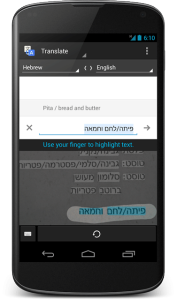
via seroundtable
Let’s say you are reading a classic French novel and you come across an unknown word. You could just go to your bookshelf, pull out a French-English dictionary, try to open it at approximately the right letter, flip through the thin paper, parsing the alphabetic order, and finally move your finger across the page until you spot the word. Chances are, however, that by the time you finally return to the text at hand, you’ve completely lost the context.
Enter, the smartphone. By using an application right by your side you can quickly type in the foreign word or just scan it with your phone’s camera.
The benefit of using a digital dictionary app is that it’s a lot faster. You don’t have to browse through hundreds of entries just to find that one word. And the faster you can get the translation for difficult words, the quicker you can return to the story.
One of my favorite mobile dictionaries (at least when it comes to German and English) is probably dict.cc. You can run it in your phone’s browser, or download the app [Android] [iOs].
When it comes to scanning and translating, there are many different apps. So far, I’ve only tried the Google Translate app [Android] (the iOS version doesn’t seem to have this feature), and it works surprisingly well. Just tap the camera icon, take a photo, wait for the app to scan the image and then mark the words you want translated.
2. Hunting for Words
Depending on the text you’re reading there might be words what you won’t find in a standard dictionary, such as slang, jargon and proper names.
Here once again, your phone can be a great device for tracking down that unusual bit of vocabulary via a search engine, browsing through forums, Wikipedia articles and even image search results.
You could of course do all of that on your desktop computer as well, but using a smartphone means having that whole world of information at your fingertips even while lounging in a deck chair or a hammock.
3. Save it Flash it, Flip it, Use it!
Last but not least, you can use your smartphone to help you memorize new words that you come across in your reading journey.
Since you are already typing in foreign vocabulary to look it up, you might just as well save it for further study. There are a thousand different apps for creating, organizing and using flashcards on your phone or mobile device.
One of my favorites is Lingualy [Android] [iOS], because looking up words in it’s dictionary automatically adds them to your flash cards deck which is stored in the cloud so you can have access to your word lists and practice from anywhere. So far, it supports Russian, French, Spanish, English, Hebrew and Arabic.

Do you use your smartphone while reading foreign language texts? Which dictionaries and apps would you recommend for which languages?

 About the author:
André Klein was born in Germany, has grown up and lived in many different places including Thailand, Sweden and Israel. He has produced two music albums, performed and organized literary readings, curated an experimental television program and is the author of various short stories and non-fiction works.
About the author:
André Klein was born in Germany, has grown up and lived in many different places including Thailand, Sweden and Israel. He has produced two music albums, performed and organized literary readings, curated an experimental television program and is the author of various short stories and non-fiction works.
The post 3 Ways to Use Smartphones To Learn Foreign Languages By Reading Books appeared first on Learn Out Live!.





July 18, 2014
All You Can’t Read: The Problem With Ebook Subscription Models

Bibliothèque National de France (by Chris P Dunn, CC)
The latest leak (update: the service is now officially live for US customers) of the Kindle Unlimited subscription service comes as no big surprise. For a fixed price of $9.99 per month readers can get as many books as they like. The so called “Netflix for Books” model is nothing new. Services like Oyster and Scribd have already attracted millions of hopeful investor dollars.
Traditional publishers however, who already have their knickers in a twist due to Amazon — which they vigorously attack in lieu of much broader sweeping changes — are not going to embrace this new subscription model with open arms.
THE SALES CEILING
The most obvious reason why publishing houses are wary of models like these is because they fear for their sales statistics:
An unlimited plan is expected to put a ceiling on a reader’s total expenses for books, therefore capping the costs of the most lucrative customers. Readers will spend less, writers will be paid less, books will disappear, and the Earth will hurtle toward the sun due to an increase in fiber from the decrease in paper pulping. - Danny Crichton
It’s easy to put all the blame on companies and their business-models, but perhaps we should take a step back and examine the changes to our reading culture in general.
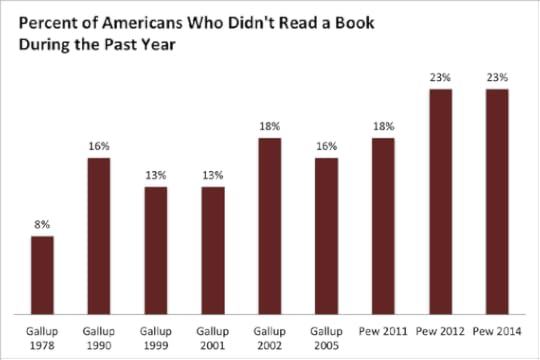
via theatlantic.com
THE CONSUMPTION CEILING
How many newspaper articles and blog posts do you read per week? How many Facebook statuses? How many tweets? And in contrast, how many books do you purchase and actually read (!) per month?
The universe may be infinite but our attention span is not. Unfortunately, after doing all the other things dictated by our mammalian condition, from acquiring food and shelter to nurturing offspring and social connections, there is only so much time left in our life.
Social media, texting, online journalism and gaming (especially in their mobile manifestation) are already heavily eating into the remaining hours and minutes, and reading books is by far not the only way anymore to take a vacation from the drabness of day to day living.
We used to bridge these hollow moments in waiting rooms, queues and commutes by reading books and magazines. Today, most of us have succumbed to the forces of swiping and tapping, crushing candies and expressing our innermost feelings via emoji wherever we find ourselves sandwiched in between two moments.
Reading is increasingly becoming a conscious choice. We don’t just find ourselves picking up magazines all that often anymore. When we wake up in the middle of the night, our first impulse is to reach for our phone instead of the nightstand tome.
THE MESSAGE IS THE MESSAGE
If I were to predict how people will purchase books in the future, I’d say we will probably both pay for subscriptions and continue to shop for single titles. They will exist side-by-side, the subscriptions will cater to the increasingly endangered species of the voracious book-bingers and the rest of us will buy a single book each few months, in the hope that one day we’ll find the time and muse to actually read it.
It’s absolutely clear, though, that reading long form material of any kind will have to compete with the plethora of alternative entertainment activities, more of which are cropping up every day.
In other words, it’s not just the future of publishing which is at stake, but the entire reading culture is being disrupted. The way we are consuming (and producing) texts is changing faster than we can document it.
And yet, there is no need to worry. As long as there will be humans there’ll always be an aching need for great stories and gripping ideas. Whether we get our fix from parchment scrolls or glowing screens, paying with seashells or BitCoins, we are creatures of words, inevitably drawn to the worlds they conjure up.
As writers and publishers, this should be our only concern. We simply have to serve these stories and ideas in whatever way people prefer. If we keep that in mind, everything else will fall into place.

 About the author:
André Klein was born in Germany, has grown up and lived in many different places including Thailand, Sweden and Israel. He has produced two music albums, performed and organized literary readings, curated an experimental television program and is the author of various short stories and non-fiction works.
About the author:
André Klein was born in Germany, has grown up and lived in many different places including Thailand, Sweden and Israel. He has produced two music albums, performed and organized literary readings, curated an experimental television program and is the author of various short stories and non-fiction works.
The post All You Can’t Read: The Problem With Ebook Subscription Models appeared first on Learn Out Live!.





July 7, 2014
Add a German-English Dictionary To Your Android Kindle App
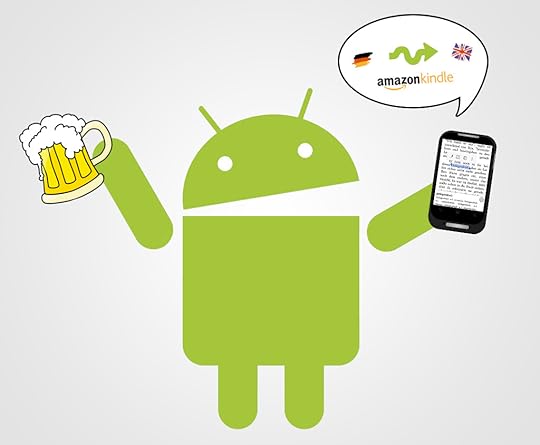
After writing a tutorial on how to enable a German-English dictionary on the Kindle app for iPad and iPhone, today I’d like to share with you how to enable the same functionality on your Android Kindle app.
The process is a bit of a “hack”, i.e. you will have to work with the phone’s internal file structure, but the process is relatively simple, virtually danger-free and no rooting is required. In this tutorial I will focus on a German-English dictionary, but you can apply the same procedure to almost any language.
I. Download the Standard German-German Dictionary
While opening any German book in your Kindle app, long-press on a word to get the dictionary popup. If you haven’t downloaded the standard German-German dictionary yet, you will be prompted to do so. Just tap “Download” and wait a few moments.
After installing the standard German-German dictionary, you will be able to tap any words in your books and get a German explanation of the vocabulary. For beginners and intermediate learners, this will not be very helpful. This is why we’re going to replace the standard German-German dictionary with a German-English dictionary in the next step.
before download (left) and after download (right)
II. Replace The Default Dictionary With a German-English Dictionary
For the next step, we’re going to need to download a dictionary from somewhere. As usual, I recommend this site as a starting point where you can get (not perfect) but free dictionaries. Look for where it says German -> English (or click here) to download the dictionary to your computer.
After having downloaded your new dictionary, connect your Android device to your computer. Note: You could do all of this process directly on your Droid as well by using an app such as ES File explorer, but for now I’ll show how to do it in Windows Explorer.
1. Navigate to the Kindle App Folder on Your Android Device
Depending on how your device is set-up you’ll find the Kindle app data under Internal storage/Android/data/com.amazon.kindle/files/ or sdcard/Android/data/com.amazon.kindle/files.
2. Look For A Folder With The Name B003YL4LVQ
Once you’re in the Kindle App folder of your Android device, look for a folder with the name B003YL4LVQ. This is the folder where the standard German-German dictionary is stored. The actual filename of the German dictionary is B003YL4LVQ_EBOK.prc
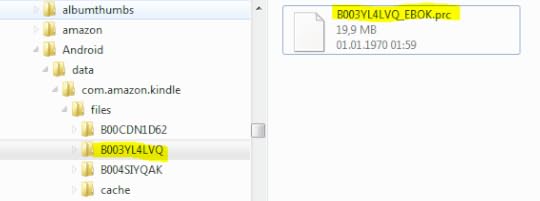
NOTE: If you’re trying to translate from a different language than German, the folder and filename will be different. To find the default dictionary for another language, just download it through the app and then check the file structure for new folders.
3. Copy The German-English Dictionary Into The App Folder
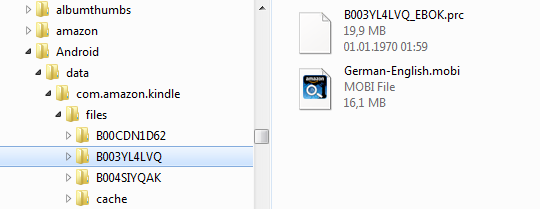
4. Change The Filenames Of the Old And The New Directory (IMPORTANT!)
In this step, we’re going to trick the Android Kindle app into thinking that our new German-English dictionary is actually the old German-German one. In order to do this, we simply rename the new dictionary to the filename of the old one. As you can see below, I’ve changed German-English.mobi to B003YL4LVQ_EBOK.prc.
Windows will complain that “the file may become unusable” but you can just ignore that and click “Yes”. (If you want to keep the old dictionary, you can also rename the original B003YL4LVQ_EBOK.prc to B003YL4LVQ_EBOK.prcOLD or something like that)

III. Enjoy Your New German-English Dictionary
That’s it! Now you should be able to tap on German words and get the the English translation. If it doesn’t work immediately, restart your Kindle Android app.
Below I’ve added a few screenshot of our new German-English dictionary in action. Simply tap a word to get the translation. By tapping on “Full Definition” in the popup you can read the whole dictionary entry and get more information about individual words.
German-English dictionary installed and working on Android Kindle app

 About the author:
André Klein was born in Germany, has grown up and lived in many different places including Thailand, Sweden and Israel. He has produced two music albums, performed and organized literary readings, curated an experimental television program and is the author of various short stories and non-fiction works.
About the author:
André Klein was born in Germany, has grown up and lived in many different places including Thailand, Sweden and Israel. He has produced two music albums, performed and organized literary readings, curated an experimental television program and is the author of various short stories and non-fiction works.
The post Add a German-English Dictionary To Your Android Kindle App appeared first on Learn Out Live!.





July 1, 2014
Practical Questions and Answers For First or Second Time Authors

Some rights reserved by JD Hancock
Today I’m writing to you with some lessons and thoughts from the author’s desk. I am a language tutor, turned blogger, turned nearly-done-author of two “Smart Guides to Language Learning”, and currently in the middle of all the work that goes into self-publishing. It’s rewarding to write your own book, put it out on virtual and even real shelves and slowly see how the world engages with it. But one thing that I do not think I would call this process is “easy”. When I first published my book Fluency Made Achievable, I was dabbling. I put a lot of effort into proofreading and working through the script by myself, but I was not confident enough to show the script and exercises to many people. The reviews of the book were ready after it was published. They were excellent and supportive, but still I believed I’ve not done this right.
So where did that leave me? in front of my computer, eyeing up the Kindle sales dashboard and incredulous at every sale. The author of the book felt like she was a fraud! I was fed up with myself. I was ready to do this again, to collect all my courage and believe the book can be better, bigger and more beautiful. I hit “unpublish” on Kindle and vowed to write an extra chapter, then re-issue the book and REALLY make some noise this time.
Now it’s four months later. That extra chapter turned into a whole new book. My two books are so nearly done. I can’t wait to share them (please do sign up for my list to get to see my new books) – but before then, I want to tell you a bit more about the process. Behind the scenes of book writing, there are some big and small questions when you republish or rewrite, and lessons to be learnt from the first book launch. This quick summary is written from within the “battlefield” of a launch, and I cannot tell you if every strategy will work out. But what I can promise you is that these are thoughts I didn’t even have the first time I published my book, and so they’re definitely worth reading if you’re working up to the process.
1) Can I Publish A Collection of Blog Articles?
When you blog, you work on a single idea in your mind and get into the flow of your article with relative ease. But with a book, there’s a larger picture to what you are producing. It’s more difficult to break up your writing into many subheadings, and can be a true pain to keep track of what you are producing. Writing a book instead of a blog article means keeping a reader engaged and entertained through the structure of your story, staying on a single project for much longer and deleting a lot more unsuitable chapters. It is no wonder that many first-time writers prefer to create a collection of blog articles or short stories, and personally I would encourage you to give it a go. You will not benefit from the same creative lessons, but your confidence will rocket, you will boost your blog’s image and stand proudly as someone who has something to say.
2) Do I Need an Editor or Can I Save Some Money Here?
When I first worked on Fluency Made Achievable, I had just a proofreader and my boyfriend. But this time, I am working with a wonderful editor. Not only is she someone who I have bonded with over the many challenges we face as independent home-based businesswomen (think tinned soup lunches), but I have also found the support and belief that I didn’t even know I needed. Writing a whole book all by yourself is HARD. It demands more discipline, self-belief and willpower than you could expect, so you will need that external driver. Having an editor will elevate the book and make my language and thoughts that much better and clearer. Having a person that you are responsible to will make you a better writer. It will make you produce something, and stop standing in your own way quite as much. In other words, get an editor that you trust. They are very valuable.
3) Should I Put This Out On Kindle?
When I first published my book, I put it out on the Kindle store. André gave me some excellent advice, in fact. He asked “Why would you deliberately avoid putting your book into the world’s largest bookshop?” But actually, we’re independent people here. Amazon and Kindle are incredibly supportive for first time author/publishers, but they also create a crowded marketplace in which no buyer knows what kind of quality you are producing. I also found that publishing my book through Amazon made me feel frustrated because I was unable to offer the extras I would have loved to give my readers, like videos, audio content and events. When you sell on Amazon, you don’t know who’s bought your book. So the ultimate question here is “Who are you writing the book for?” If it’s for your website readers first and foremost, then consider making Amazon the second (not the first) place of publication. You keep the copyright of your own product, so it’s ever possible to experiment and draw the best conclusions for yourself.
4) Why Do I Keep Changing My Mind?
My working titles are just that: Working Titles. The books changed names at least 25 times before I settled on a title. And along the way, I edged closer to the true book every day. The same goes for the draft, the cover, the chapter structure, everything. You can see a glimpse of my process on my Instagram. Book writing is ever edging towards success, but one thing I know. When I publish this thing, it’s not because it is finished or perfect. It will never be finished or perfect in my eyes. When I publish, it’s because I’ve been disciplined enough to set myself a deadline and decide that this is when I am “good enough”. Last time I received a wonderful set of 5 Star reviews and a very warm welcome – this time it’s a bit less scary as a result. I have decided to publish both books on the same date, and make them consistent as parts of a series of “Smart Guides To…”, but I would have never done this if it had not been for hours of doubt and discussion with my partner. Have a patient sounding board, but accept that you will change your mind all the time.
5) Am I Just Messing Around Here?
Not having a traditional publisher means doing away with a lot of external credibility. After all you are the one standing up and declaring yourself an author. Here, I only have one lesson, and that is to go PRO right from day 1. Invest what you can in telling people about this book, in making it pretty and adding in anything that you want. Your technology and experience are not up to traditional publisher standards, so you have to ask people how to do this thing. Take their advice seriously, stand up tall and hire someone to do the things you don’t want to do. That’s how you go pro. For my relaunch of the guides, I spent a lot of time reading extremely ambitious business advice and then decided to get a real graphic artist to make me the most handsome cover I could possibly have. I’m excited about this thing. It will look good, it will inspire confidence in me and in other people.
I hope some of my points above resonated with you and gave you the energy and motivation to work hard on your product and get publishing. Don’t wait for a traditional publisher to tell you if you are ready – decide it yourself.
Kerstin
x
You’ve been reading a guest post by Kerstin Hammes

Kerstin Hammes is a native German speaker and has lived in the UK since 2003. She’s passionate about languages and has studied English, French, Italian, Latin, Spanish and Russian. Kerstin is the lady behind Fluent Language Tuition and teaches students of German, French and English as a Foreign Language as a tutor and coach. You can say hello to her on Twitter, Facebook and Google+

 About the author:
Kerstin Hammes is a native German speaker and has lived in the UK since 2003. She’s passionate about languages and has studied English, French, Italian, Latin, Spanish and Russian. Kerstin is the lady behind Fluent Language Tuition and teaches students of German, French and English as a Foreign Language as a tutor and coach. You can say hello to her on Twitter, Facebook and Google+
About the author:
Kerstin Hammes is a native German speaker and has lived in the UK since 2003. She’s passionate about languages and has studied English, French, Italian, Latin, Spanish and Russian. Kerstin is the lady behind Fluent Language Tuition and teaches students of German, French and English as a Foreign Language as a tutor and coach. You can say hello to her on Twitter, Facebook and Google+
The post Practical Questions and Answers For First or Second Time Authors appeared first on Learn Out Live!.





June 29, 2014
Movies for Your Ears, and other Podcasts

Some rights reserved by Bethan
Last week, I met a lot of amazing people and learned many new things. I sat down with the German that landed a Cessna on Moscow’s Red Square in the Cold War, listened to the Choirboy Robber’s exploits, and found out that the key ingredient to a successful marriage are multiple bathrooms.
And best of all all, I didn’t even have to leave the house for any of that. I met all these people and heard their stories while chilling on the sofa or doing the dishes.
Unique Stories for Your Ears Only
I’ve always been a fan of late night public radio broadcasts, listening to conversations with curious strangers, radio plays and the odd interview with people who — contrary to the endless parade of celebrities, politicians and spokespersons — actually have something interesting to say.
The beautiful thing about the medium of radio is that it’s so personal. A broadcast might be going out to hundreds of thousands of listeners, but you, the listener, feels like it’s just for you. Compared to TV or the Internet, it’s a rather intimate medium. The best radio shows are narrative driven, highly personal and have the power to draw you into different worlds.
As Ira Glass act, host of the famous radio show This American Life, once said:
You have to ask yourself, What is the radio good for? The radio is good for taking somebody else’s experience and making you understand what it would be like. Because when you don’t see someone, but you hear them talking-and, uh, that is what radio is all about-it’s like when someone is talking from the heart. Everything about it conspires to take you into somebody else’s world. – Chicago Magazine, 2007
Podcasts: Anytime, Anyplace, Any Topic
In short, the medium is great, but the delivery often is not compatible with our busy schedules. Podcasts on the other hand take everything that’s great about radio and remove all of its limitations in terms of availability.
What makes podcasts so great is that you don’t have to sit hunched over the radio in the wee hours of the morning , just to catch that one special show. You can listen to podcasts whenever you like, wherever you are , and you can hit pause at any time.
A Collective Of The Best Story-Driven Shows
There are many ways to find good podcasts, but if you’re looking for high-quality independent storytelling that will make you both think and smile, the radiotopia network is a great place to start.
I haven’t listened to all of different shows yet, but each episode that I’ve downloaded so far was just excellent. Here’s a quick overview of some of their shows:
This popular podcast and radio broadcast is all about design, architecture, and invisible structures in the world around us. Each episode is beautifully crafted to tell a story which will stay in you mind long after listening.
Strangers is a beautiful podcast dedicated to telling the stories about “people we meet, the connections we make, the heartbreaks we suffer, the kindness we encounter, and the frightful moments when we discover we aren’t even who we thought we were.”
On this podcast you’ll find short, often darkly funny stories that combine great writing with heartfelt performances and immersive sound design. Each episode is created by a team of screenwriters and actors, bringing you short and exciting “movies for your ears”.
This podcast features an eclectic mix of journalism, fiction, art, interviews, and the occasional exploding pipe dream. On the Theory of Everything you’ll hear great “conversations with philosophers, friends, and the occasional too-good-to-be-real guest.”
On this podcast you’ll find wondrous and meticulously produced conversations “exploring all of life’s gray areas on an eclectic range of subjects, from the seedy to the sublime”. The excellent sound design make each second of this podcast a pleasure.
Note: You can find all of these podcasts on iTunes or via radiotopia.fm. Apple users, go through the native Podcasts app or iTunes, Android users check out this great free app Podcast Republic.
-

 About the author:
André Klein was born in Germany, has grown up and lived in many different places including Thailand, Sweden and Israel. He has produced two music albums, performed and organized literary readings, curated an experimental television program and is the author of various short stories and non-fiction works.
About the author:
André Klein was born in Germany, has grown up and lived in many different places including Thailand, Sweden and Israel. He has produced two music albums, performed and organized literary readings, curated an experimental television program and is the author of various short stories and non-fiction works.
The post Movies for Your Ears, and other Podcasts appeared first on Learn Out Live!.





June 19, 2014
10 Tumblr Blogs For German Learners

After giving you a quick list of great Twitter feeds for German learners, let’s have a look today how you can boost your German-Fu while traversing the Tumblrverse. Whether you’d like to discover more German songs, learn new words with shiny photos or just want to feast your eyes on quaint city centers, there’s something for everyone.
Note: If you have your own Tumblr blog for German learners and don’t find it in this list, feel free to add your own blog in the comments below.
Daily Deutsch Doodles
Probably one of my all-time-favorite German Tumblr blogs, Daily Deutsch Doodles features unique illustrations by the author which depict strange German words and expressions in a very unique visual style. An absolute must-follow!
URL: daily-deutsch-doodles.tumblr.com

daily-deutsch-doodles.tumblr.com
Warum wir Deutschland mögen
This Tumblr blog is full of interesting links, videos and images about German language and culture. Also, you’ll find here original quotes by German poets and philosophers with their English translation. Definitely worth a look for anyone interested in Land & Leute (the country and the people).
URL: thatswhywelovegermany.tumblr.com
Daily Dose of German
Daily Dose of German is an active Tumblr blog which publishes German language music videos, photos from German cities and landscapes and much more.
URL: deutschtaeglich.tumblr.com
Ren lernt Deutsch
This Tumblr blog is maintained by Ren, a Filipino from Singapore who’s learning German. Ren regularly collects helpful and funny posts related to German learning from around the Tumblrverse.
URL: renlerntdeutsch.tumblr.com
Sprüche auf Deutsch
This Tumblr blog is a simple image-based blog that posts German and Austrian words and proverbs (including the English translation). It’s still a very young blog, but hopefully it’ll continue for a long time.
URL: sprueche-auf-deutsch.tumblr.com

sprueche-auf-deutsch.tumblr.com
F*k Yeah, Deutsch
Never mind the title of this Tumblr, it’s a mostly text-based Tumblr for learning German words and expressions. In their own words: “a tip a day keeps the bad grades at bay!” Unfortunately, this Tumblr hasn’t been updated for a while, but the archive goes back until December 2010, so there’s a lot of material to discover.
URL: fuckyeahdeutsch.tumblr.com
GERMANNN
Maintained by a young German native-speaker, this blog is “dedicated to the German language and culture”, featuring music videos, vocabulary posts, memes and interesting Q&As.
URL: germannn.tumblr.com
German Words And More
… is another image-based Tumblr blog for German learners which posts German words in a flash-card-like format with the German word above and the English explanation/translation below. Unfortunately, this Tumbler is no longer maintained, but the archive is worth a look if you enjoy weird and funny German words and idioms.
URL: germanwordsandmore.tumblr.com
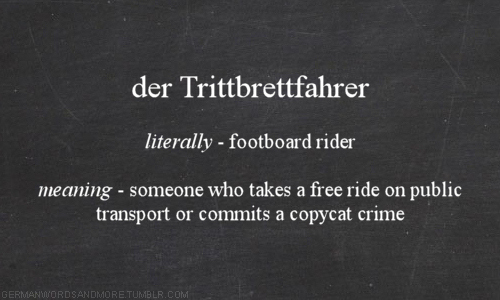
Willkommen in Deutschland
On Willkommen in Deutschland you’ll find German language music videos, information about geography and culture and lots of beautiful photos from German cities and landscapes. A good blog to visit when you’re tired of grammar and just want to get a feel for the culture as a whole.
URL: willkommen-in-germany.tumblr.com
Words in German
Nomen est omen with this Tumblr blog, which — who’d have guessed — posts words in German, served on photos. You can even suggest new words to the authors of the blog.

 About the author:
André Klein was born in Germany, has grown up and lived in many different places including Thailand, Sweden and Israel. He has produced two music albums, performed and organized literary readings, curated an experimental television program and is the author of various short stories and non-fiction works.
About the author:
André Klein was born in Germany, has grown up and lived in many different places including Thailand, Sweden and Israel. He has produced two music albums, performed and organized literary readings, curated an experimental television program and is the author of various short stories and non-fiction works.
The post 10 Tumblr Blogs For German Learners appeared first on Learn Out Live!.





June 10, 2014
A Free German Pronunciation Guide Booklet and Audio Lessons

by Marc Wathieu via Flickr
The process of learning a new language has many moving parts, whether it’s slippery sentence structures, esoteric conjugation rules (and exceptions!) or just simply too many sounds that knot your throat and twist your tongue.
Different Pronunciation Approaches For Different People
There are many ways to improve German word pronunciation, whether it’s working with audio lessons or studying vocabulary with phonetic or orthographic transcriptions. The perfect method doesn’t exist, there are simply some approaches which work better for some people sometimes.
For example, when it comes to beginners who don’t yet have enough vocabulary to deal with German audio lessons and also don’t feel comfortable reading the International Phonetic Alphabet, simply working with transcriptions of the target language’s sounds in their native languages’s spelling system can be helpful.
A Free German Word Pronunciation Guide by Vincent Ryan
Recently, one of my readers sent me a short German pronunciation guide he authored, which teaches basic vocabulary and German word pronunciation by spelling them out as if they were English. Put simply, instead of giving you the German word “Vogel” and letting you puzzle over its pronunciation, this guide will spell it out as “foe-gal” (or similar).
Vincent Ryan, author of this booklet titled “Spaß … is fun in German” , explains his idea behind the guide as follows:
“I began learning and loving German at age 11 but quickly became the only class member as all of my fellow pupils dropped out. [W]hen my own sons were faced with the same problems in their language education at ages 11,12, 13 etc (very old, worn and dull verb ending tables and complicated language terms – Nominative, Dative, Genitive etc) I decided to write a simple, hopefully attractive starter booklet to grasp and ignite their interest.
To give them skills to create simple (and useful) sentences and pronounce them as correctly as possible using understandable methods rather than, for example, Phonemes.”
You can download Vincent’s free German pronunciation guide here, directly from his website at thevincentryan.com as a full-color 26 page PDF, no strings attached.
3 German Pronunciation Audio Resources
Depending on the set of sounds that already exists in your own language, it may be easier or more difficult to acquire the pronunciation mechanics (of tongue, palate, teeth, etc.) which will yield the desired sounds of your target language.
Just like Germans are struggling with the “th” sound in English, for example, native English speakers almost always have difficulties pronouncing the “ü” in “Mütter” or the “ch” in words like “ich” or “Sache”, simply because these phonemes don’t exist in English.
In these cases, learning to read IPA transcription is good, but adding German pronunciation audio to the mix is even better!
1. Get German Word Pronunciation From Forvo
 Forvo is a site where people from all over the world record themselves saying words in their native language. Ever wondered how to pronounce “Schadenfreude” or “Fahrvergnügen” correctly? Just enter the word in the search box and hit play.
Forvo is a site where people from all over the world record themselves saying words in their native language. Ever wondered how to pronounce “Schadenfreude” or “Fahrvergnügen” correctly? Just enter the word in the search box and hit play.
They have more than 300,000 German pronunciation audio files by more than 10,000 German speakers!
2. Hear German Pronunciation For Short Sentences Via Google
If you don’t just need the pronunciation for single words but would like to hear German word pronunciation in small sentences, you can use Google Translator to say them out loud. Just like Google’s translation, this feature is not perfect but gets it right often enough if you don’t challenge it too hard.
3. Free German Audio Lessons From Audio-Lingua
 Last but not least, you can browse the archive of German audio lessons on Audio Lingua to find short recordings suitable for your learning stage. Simply select your level and listen.
Last but not least, you can browse the archive of German audio lessons on Audio Lingua to find short recordings suitable for your learning stage. Simply select your level and listen.
You can find more than 800 free German audio lessons on this site, across all levels from absolute beginners to intermediate and advanced.
-
image: Some rights reserved by Marc Wathieu

 About the author:
André Klein was born in Germany, has grown up and lived in many different places including Thailand, Sweden and Israel. He has produced two music albums, performed and organized literary readings, curated an experimental television program and is the author of various short stories and non-fiction works.
About the author:
André Klein was born in Germany, has grown up and lived in many different places including Thailand, Sweden and Israel. He has produced two music albums, performed and organized literary readings, curated an experimental television program and is the author of various short stories and non-fiction works.
The post A Free German Pronunciation Guide Booklet and Audio Lessons appeared first on Learn Out Live!.





A Free German Pronunciation Guide Booklet and Audio Lessons For Beginners

by Marc Wathieu via Flickr
The process of learning a new language has many moving parts, whether it’s slippery sentence structures, esoteric conjugation rules (and exceptions!) or just simply too many sounds that knot your throat and twist your tongue.
Different Pronunciation Approaches For Different People
There are many ways to improve German word pronunciation, whether it’s working with audio lessons or studying vocabulary with phonetic or orthographic transcriptions. The perfect method doesn’t exist, there are simply some approaches which work better for some people sometimes.
For example, when it comes to beginners who don’t yet have enough vocabulary to deal with German audio lessons and also don’t feel comfortable reading the International Phonetic Alphabet, simply working with transcriptions of the target language’s sounds in their native languages’s spelling system can be helpful.
A Free German Word Pronunciation Guide by Vincent Ryan
Recently, one of my readers sent me a short German pronunciation guide he authored, which teaches basic vocabulary and German word pronunciation by spelling them out as if they were English. Put simply, instead of giving you the German word “Vogel” and letting you puzzle over its pronunciation, this guide will spell it out as “foe-gal” (or similar).
Vincent Ryan, author of this booklet titled “Spaß … is fun in German” , explains his idea behind the guide as follows:
“I began learning and loving German at age 11 but quickly became the only class member as all of my fellow pupils dropped out. [W]hen my own sons were faced with the same problems in their language education at ages 11,12, 13 etc (very old, worn and dull verb ending tables and complicated language terms – Nominative, Dative, Genitive etc) I decided to write a simple, hopefully attractive starter booklet to grasp and ignite their interest.
To give them skills to create simple (and useful) sentences and pronounce them as correctly as possible using understandable methods rather than, for example, Phonemes.”
You can download Vincent’s free German pronunciation guide here, directly from his website at thevincentryan.com as a full-color 26 page PDF, no strings attached.
3 German Pronunciation Audio Resources
Depending on the set of sounds that already exists in your own language, it may be easier or more difficult to acquire the pronunciation mechanics (of tongue, palate, teeth, etc.) which will yield the desired sounds of your target language.
Just like Germans are struggling with the “th” sound in English, for example, native English speakers almost always have difficulties pronouncing the “ü” in “Mütter” or the “ch” in words like “ich” or “Sache”, simply because these phonemes don’t exist in English.
In these cases, learning to read IPA transcription is good, but adding German pronunciation audio to the mix is even better!
1. Get German Word Pronunciation From Forvo
 Forvo is a site where people from all over the world record themselves saying words in their native language. Ever wondered how to pronounce “Schadenfreude” or “Fahrvergnügen” correctly? Just enter the word in the search box and hit play.
Forvo is a site where people from all over the world record themselves saying words in their native language. Ever wondered how to pronounce “Schadenfreude” or “Fahrvergnügen” correctly? Just enter the word in the search box and hit play.
They have more than 300,000 German pronunciation audio files by more than 10,000 German speakers!
2. Hear German Pronunciation For Short Sentences Via Google
If you don’t just need the pronunciation for single words but would like to hear German word pronunciation in small sentences, you can use Google Translator to say them out loud. Just like Google’s translation, this feature is not perfect but gets it right often enough if you don’t challenge it too hard.
3. Free German Audio Lessons From Audio-Lingua
 Last but not least, you can browse the archive of German audio lessons on Audio Lingua to find short recordings suitable for your learning stage. Simply select your level and listen.
Last but not least, you can browse the archive of German audio lessons on Audio Lingua to find short recordings suitable for your learning stage. Simply select your level and listen.
You can find more than 800 free German audio lessons on this site, across all levels from absolute beginners to intermediate and advanced.
-
image: Some rights reserved by Marc Wathieu

 About the author:
André Klein was born in Germany, has grown up and lived in many different places including Thailand, Sweden and Israel. He has produced two music albums, performed and organized literary readings, curated an experimental television program and is the author of various short stories and non-fiction works.
About the author:
André Klein was born in Germany, has grown up and lived in many different places including Thailand, Sweden and Israel. He has produced two music albums, performed and organized literary readings, curated an experimental television program and is the author of various short stories and non-fiction works.
The post A Free German Pronunciation Guide Booklet and Audio Lessons For Beginners appeared first on Learn Out Live!.









